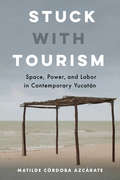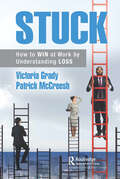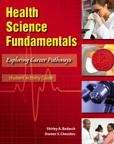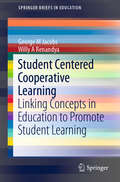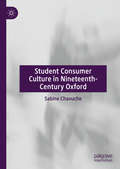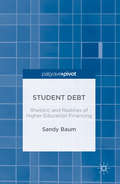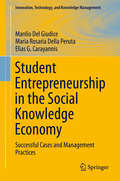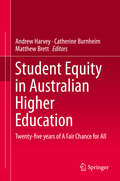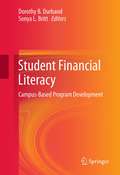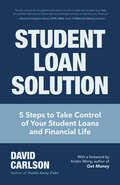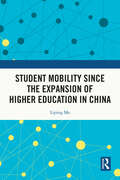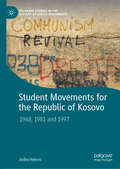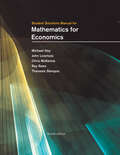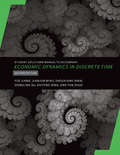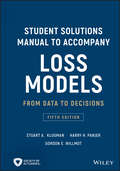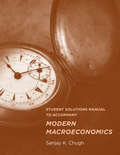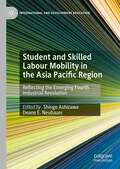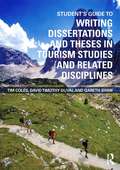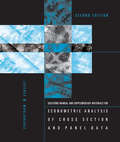- Table View
- List View
Stryker Corporation: Capital Budgeting
by Timothy A. LuehrmanExamines some parts of Stryker Corporation's systems and procedures for approving and authorizing capital spending of many different types, including buildings, machinery, and working capital for existing businesses, as well as transactions with third parties such as acquisitions, joint ventures, and licensing agreements. Set in early 2007, nearly two years after significant modifications in these systems and procedures. Stryker has compiled a remarkable track record of consistently high growth in profitability over more than 20 years. The modifications to its capital budgeting procedures are partly intended to support the company's efforts to continue this success.
Stuck with Tourism: Space, Power, and Labor in Contemporary Yucatan
by Matilde Córdoba AzcárateTourism has become one of the most powerful forces organizing the predatory geographies of late capitalism. It creates entangled futures of exploitation and dependence, extracting resources and labor, and eclipsing other ways of doing, living, and imagining life. And yet, tourism also creates jobs, encourages infrastructure development, and in many places inspires the only possibility of hope and well-being. Stuck with Tourism explores the ambivalent nature of tourism by drawing on ethnographic evidence from the Mexican Yucatán Peninsula, a region voraciously transformed by tourism development over the past forty years. Contrasting labor and lived experiences at the beach resorts of Cancún, protected natural enclaves along the Gulf coast, historical buildings of the colonial past, and maquilas for souvenir production in the Maya heartland, this book explores the moral, political, ecological, and everyday dilemmas that emerge when, as Yucatán’s inhabitants put it, people get stuck in tourism’s grip.
Stuck: How to WIN at Work by Understanding LOSS
by Victoria Grady Patrick McCreeshOur work life is changing. Every day new companies, technologies, and ideas emerge that impact how, where, and most importantly, why we work. Despite this exciting evolution, people remain the heart of change. People are tricky. People don’t seem to evolve as fast as global trends. People get Stuck. Teams have people moving at different speeds with different levels of adoption in our evolving workplace. Some evolve and some don’t. Teams get Stuck. Leaders, managers, and teammates struggle with this resistance and get frustrated. Frustrated people impact the performance of every organization. Organizations get Stuck. Why? The answer is deeply human and biological, rooted in the way our brain interacts with everything in the world, even work. When people feel they are losing something, they react by getting Stuck. Stuck connects over 20 years of research on our brain’s reaction to the evolving workplace with real stories of people journeying through the challenge of being Stuck. The organizations, leaders, and managers who understand these concepts will evolve with the future. Those organizations will understand LOSS as a tool to achieve business WINs. This book addresses a critical concept that closes a gap in other popular business publications. Many books tell leaders and managers the process of how to change their organizations. However, many of these books lack a key mechanism for understanding human interactions. The mechanism is a biological function developed through evolution called attachment – the human need to connect to different tangible and intangible objects for support. Attachment is the reason that people connect with leaders and corporate culture, but also what creates a deep sense of loss during even the smallest changes. Stuck offers a complete understanding of attachment and how it impacts individuals, relationships, and organizations. The root of the challenge is the human need to connect to different tangible and intangible objects for support. The basis of the need for support is grounded in our need for attachment. Those who learn to understand loss through attachment behavior and the attachments of others will succeed. In addition, this book provides original data-based evidence from assessments conducted with nearly 20,000 respondents and original stories from the application of attachment concepts in more than 150 organizations across all sectors around the globe. It shines a light on attachment and use it as a lens to better understand our workplace. Stuck is not an academic study. It is a practical guide for leading the brain through change. For the first time, the authors tell stories that demonstrate their research and offer a roadmap for how to leverage attachment research to drive business success. Stuck provides not only the deep lessons from the authors’ research, but clear steps for readers to use the lessons of attachment in their own work. In this way, the book serves as a guide to those leaders, managers, and employees who are ready to be unStuck.
Student Activity Guide for Health Science Fundamentals
by Shirley A. Badasch Doreen S. ChesebroProvides students with a variety of practice activities that include worksheets, scenarios, activities, and selected check-off sheets designed for both practice and competency assessment. These check-off sheets provided step-by-step instructions to help students perform Procedures correctly and competently. All of these activities will help students successfully learn the skills required for their respective career choices.
Student Centered Cooperative Learning: Linking Concepts in Education to Promote Student Learning (SpringerBriefs in Education)
by George M Jacobs Willy A RenandyaThis book helps teachers understand the links between cooperative learning (also known as collaborative learning and peer learning) and other student-centered approaches. It discusses cooperative learning and communities of practice; cooperative learning and neuroscience; cooperative learning and critical thinking; cooperative learning and alternative assessment; cooperative learning and multiple intelligence; cooperative learning and positive education; cooperative learning and meeting the needs of introverts; and cooperative learning and justice issues, with each chapter exploring a different aspect of how education can be student centered.If you are looking for a fresh perspective on cooperative learning, this book is for you. It helps you explore how cooperative learning is so much more than just asking students to arrange themselves in a group, and considers how cooperative learning can fit with other areas of education that you care about. Although the two authors both completed their PhDs in the West, they have taught in Asia for the past 25+ years, working with students and teachers from a wide variety of Asian and other countries, and with teachers from a very wide variety of content areas who teach students of many different ages.
Student Consumer Culture in Nineteenth-Century Oxford
by Sabine ChaoucheThis book explores students’ consumer practices and material desires in nineteenth-century Oxford. Consumerism surged among undergraduates in the 1830s and decreased by contrast from the 1860s as students learned to practice restraint and make wiser choices, putting a brake on past excessive consumption habits. This study concentrates on the minority of debtors, the daily lives of undergraduates, and their social and economic environment. It scrutinises the variety of goods that were on offer, paying special attention to their social and symbolic uses and meanings. Through emulation and self-display, undergraduate culture impacted the formation of male identities and spending habits. Using Oxford students as a case study, this book opens new pathways in the history of consumption and capitalism, revealing how youth consumer culture intertwined with the rise of competition among tradesmen and university reforms in the 1850s and 1860s.
Student Debt
by Sandy BaumThis book analyzes reliable evidence to tell the true story of student debt in America. One of the nation's foremost experts on college finance, Sandy Baum exposes how misleading the widely accepted narrative on student debt is. Baum combines data, research, and analysis to show how the current discourse obscures serious problems, risks misdirecting taxpayer dollars, and could deprive too many Americans of the educational opportunities they deserve. This book and its policy recommendations provide the basis for a new and more constructive national agenda to make paying for college more manageable.
Student Educational Loan Fund, Inc. (Abridged)
by Peter Tufano Cameron PoetzscherRick Melnick oversees the Student Educational Loan Fund (SELF), which provides loans to Harvard Business School students. SELF is changing the terms of student loans from variable-rate with semiannual payments to fixed-rate loans with equal monthly payments. Melnick must decide how to finance SELF in light of the new loan mix. SELF can use a wide range of interest rate derivative products to modify the terms of its existing financing.
Student Entrepreneurship in the Social Knowledge Economy
by Maria Rosaria Della Peruta Manlio Del Giudice Elias G. CarayannisTraditionally, the study of entrepreneurial behavior focuses on such factors as (i) the personality characteristics that distinguish the entrepreneur from non-entrepreneur and (ii) demographic characteristics such gender, age, familiar antecedents and education. With particular respect to investigating the development, acquisition, and dissemination of entrepreneurial skills and behaviors, the authors focus on the university environment, as a locus of research and innovation, where students are exposed to a wide variety of influences that are enhanced by a high degree of connectivity. The underlying theme of this volume is to develop our understanding of the sociology of student entrepreneurial behavior and in doing so attempt to synthesize literature investigating individual talent with the literature on concurrent knowledge sourcing in the pursuit of entrepreneurial activities. Specifically, the authors investigate the degree to which access to diverse knowledge (in addition to such psychological characteristics and tolerance of ambiguity and risk taking) influences the nature and probability of entrepreneurial success. Moreover, they explore the role of social media and social networking in facilitating access to distributed and disparate information and knowledge Their research addresses such timely questions as: Where do entrepreneurial opportunities come from? How can higher education best stimulate the creation of firms emanating from young and smart minds in colleges and universities? What is the value of MOOCs for frequent, early, and "thick" communication among the various specialties needed to accomplish entrepreneurial projects? How do we know whether social media affect students' responses to new knowledge and new ideas? To what extent do educational practices affect racial and ethnic differences in student entrepreneurship? What is the role of the indigenous minority student entrepreneur in establishing high-technology firms? The result is a multi-dimensional approach that sheds light on the dynamics of education, knowledge creation, social networking, innovation and new business development.
Student Equity in Australian Higher Education
by Andrew Harvey Catherine Burnheim Matthew BrettThis book examines twenty-five years of the Australian framework for student equity in higher education, A Fair Chance for All. Divided into two sections, the book reflects on the legacy of equity policy in higher education, the effectiveness of current approaches, and the likely challenges facing future policymakers. The first section explores the creation of the framework, including the major elements of the policy, the political context of its development, and how it compares with international models developed during the same period. The performance of the six student equity groups identified within the framework is also examined. The second section of the book considers future trends and challenges. The Australian university sector has undergone seismic change in the past twenty-five years and faces further changes of equal magnitude. The twenty-fifth anniversary of A Fair Chance for All comes as Australian higher education is poised for another wave of transformation, with rising expansion, competition, and stratification. While the emerging landscape is new, the questions have changed little since A Fair Chance for All was first conceived: How should we define student equity, and what policies are likely to promote it?
Student Financial Literacy
by Sonya L. Britt Dorothy B. DurbandCollege students are particularly vulnerable to making poor financial decisions. One method of addressing personal finances and financial stress among students of higher education is through university based financial education programs. Student Financial Literacy: Program Development presents effective strategies to assist in the implementation or the enhancement of a program as a tool to improve students' educational experience and financial well-being. It presents the key components of financial education programs designed to address the growing concerns associated with high levels of debt and low levels of financial literacy among college students.
Student Loan Solution: 5 Steps to Take Control of Your Student Loans and Financial Life
by David CarlsonEliminate Your Student Loan DebtStep-by-step approach to financial freedom: David Carlson is the author of the book Hustle Away Debt and founder of the millennial personal finance blog Young Adult Money. In Student Loan Solution David explains what student loan borrowers should be focusing on. He provides a 5-step approach to help you understand your loans, your options, and how to improve your greater financial life, while paying down your student loan debt. Learn how to take advantage of strategies that help you make more money, save more money, and ultimately pay down your student loans faster.Everything you need to know about student loan debt: Student loans are complicated. College financial aid terms like “federal direct subsidized” and “GRAD Plus” mean little to most of us. Each type of student loan is slightly different, with its own set of rules and repayment options. Student Loan Solution explains everything you need to know about your student loans including how they work, repayment options and opportunities for loan forgiveness, and plans for managing and paying down your loans. David Carlson covers it all.De-complicate your life: By the time you are done reading this book, you will understand student loans, gain control of your finances, and be armed with strategies to improve your finances.Don't be a statistic: For millions of Americans, paying for college meant taking out loans. If you are one of the 70% of college graduates burdened with these loans, Student Loan Solution could change your life. Fight the student loans epidemic affecting 40 million borrowers?learn the best way to pay off the college degree you worked so hard to earn.Student Loan Solution has the tools you need to start your student loans repayment with a bang. Learn how to:Pay off your student loan debtPersonalize your student loan repayment planLive a happier, financially smarter life
Student Mobility Since the Expansion of Higher Education in China
by Liping MaThis book examines the characteristics of Chinese college students' mobility since the expansion of higher education by using a nationally representative data set. It analyzes college graduates' mobility from both horizontal and vertical dimensions. The horizontal dimension shows college students' migration directions and location changes, including migration for college, migration for employment, migration for grassroots positions, migration away from the capital, and migration back to their hometown. The vertical dimension includes students' intergenerational occupational mobility and intergenerational regional mobility. Drawing on theories of education and economics, the book provides a solid framework for empirically analyzing the characteristics, causes, and economic and non-economic benefits of different forms of mobility. This book not only offers insights into China's higher education policies and their impact on the regional and intergenerational mobility decisions of college graduates over the past two decades, but also has important implications for countries at similar stages of social and economic development. This book is an excellent read for students and scholars of education, economics, and East Asian studies. It can also help policymakers understand the characteristics of students' mobility and the underlying reasons for their choices, so that they can propose effective policies in the future.
Student Movements for the Republic of Kosovo: 1968, 1981 and 1997 (Palgrave Studies in the History of Social Movements)
by Atdhe HetemiThis book analyzes the central vision of three student movements organized by different generations of Kosovo Albanian students in 1968, 1981 and 1997. By examining the dynamics of the demonstrations, the author explores the dimensions, forms and implications of student uprisings and resistance, as well as the struggles for dominance by local (Kosovo), federal (SFRY), regional (Albania and Serbia) and international actors (outside the Balkans). While these demonstrations were organized by students, the book shows that these were not necessarily academic but political, highlighting the impact that students had on society to demonstrate. It examines how the vision for “Republic” status or independence impacted the first and subsequent student movements. Moreover, due to the richness of the empirical data included, this book contributes toward further discussions on social movements, nationalism and state theories.
Student Solutions Manual for Mathematics for Economics, fourth edition
by Thanasis Stengos Michael Hoy John Livernois Chris Mckenna Ray ReesThis student solutions manual contains solutions to odd-numbered exercises in the fourth edition of Mathematics for Economics.
Student Solutions Manual to Accompany Economic Dynamics in Discrete Time, second edition
by Jianjun Miao Yue Jiang Zhouxiang Shen Dongling Su Zhiteng ZengSolutions to the odd-numbered exercises in the second edition of Economic Dynamics in Discrete Time.This manual includes solutions to the odd-numbered exercises in the second edition of Economic Dynamics in Discrete Time. Some exercises are purely analytical, while others require numerical methods. Computer codes are provided for most problems. Many exercises ask the reader to apply the methods learned in a chapter to solve related problems, but some exercises ask the reader to complete missing steps in the proof of a theorem or in the solution of an example in the book.
Student Solutions Manual to Accompany Loss Models: From Data to Decisions (Wiley Series in Probability and Statistics)
by Harry H. Panjer Stuart A. Klugman Gordon E. WillmotLoss Models: From Data to Decisions, Fifth Edition continues to supply actuaries with a practical approach to the key concepts and techniques needed on the job. With updated material and extensive examples, the book successfully provides the essential methods for using available data to construct models for the frequency and severity of future adverse outcomes. The book continues to equip readers with the tools needed for the construction and analysis of mathematical models that describe the process by which funds flow into and out of an insurance system. Focusing on the loss process, the authors explore key quantitative techniques including random variables, basic distributional quantities, and the recursive method, and discuss techniques for classifying and creating distributions. Parametric, non-parametric, and Bayesian estimation methods are thoroughly covered along with advice for choosing an appropriate model. Throughout the book, numerous examples showcase the real-world applications of the presented concepts, with an emphasis on calculations and spreadsheet implementation. Loss Models: From Data to Decisions, Fifth Edition is an indispensable resource for students and aspiring actuaries who are preparing to take the SOA and CAS examinations. The book is also a valuable reference for professional actuaries, actuarial students, and anyone who works with loss and risk models.
Student Solutions Manual to Accompany Modern Macroeconomics
by Sanjay K. ChughSolutions to odd-numbered problem set questions in Modern Macroeconomics.Solutions to odd-numbered problem set questions in Modern Macroeconomics.
Student Success For Health Professionals
by Lippincott Williams Wilkins Staff Nancy OlrechThis Second Edition of Lippincott Williams & Wilkins' Student Success for Health Professionals Made Incredibly Easy has been revised and updated with a more user-friendly organization and design, but retains the health professions focus, the concise and approachable narrative, the fun features and art, and the self-paced online course of the first edition. It is still the first and only student success text designed specifically for health professions students and programs!
Student Success at Georgia State University (A)
by Michael W. Toffel Julia Kelley Robin MendelsonGeorgia State University had developed a reputation for driving student success by nearly doubling its graduation rate for students of all racial, ethnic, and socioeconomic backgrounds. It did so while growing its student body and the proportion of Black/African American, low-income, and first-generation students-groups with historically lower postsecondary graduation rates compared to national averages. Georgia State's Student Success team, led by Tim Renick and Allison Calhoun-Brown, used a data-based approach to deploy micro-grant programs to retain students, implemented predictive analytics to improve student advising, and optimized course sequencing to help students graduate before they exhausted their financial aid. In 2016, they faced a growing "summer melt" problem where nearly 20% of incoming students who committed to attend never actually enrolled at Georgia State-and many never enrolled at any college. At the same time, they wondered how to balance continuing to incrementally improve student success at Georgia State and scaling their efforts to help the many other universities facing similar problems who sought to learn from their experience.
Student Success at Georgia State University (B)
by Michael W. Toffel Julia Kelley Robin MendelsonThis is a supplement to the Student Success at Georgia State University (A) case. The (B) case includes the results of a randomized control trial that Georgia State conducted to test education technology start-up AdmitHub's chatbot solution as a strategy for improving "summer melt" (i.e., applicants confirming that they planned to enroll but then not enrolling).
Student Workbook: Your Route to Success
by John A. Wanat E. Weston Pfeiffer Richard Van GulikDesigned to help students review content, apply knowledge, and develop critical-thinking skills. A wide variety of activities are provided for various learning styles. This supplement is a consumable resource, designed with perforated pages so that a given chapter can be removed and turned in for grading or checking. This Student Workbook is designed for use with the text Learning for Earning: Your Route to Success
Student and Skilled Labour Mobility in the Asia Pacific Region: Reflecting the Emerging Fourth Industrial Revolution (International and Development Education)
by Deane E. Neubauer Shingo AshizawaThis volume explores the implications of student mobility on higher education across the Asia Pacific Region. Student Mobility has become a major feature of higher education throughout the world, and most particularly over the past two decades within the Asia Pacific Region. This system of mobility is entering a period of profound predicted change, created by the social and economic transformations being occasioned by the rapid increased uses of artificial intelligence (AI), a process that is being increasingly framed as the “Fourth Industrial Revolution” or Work 4.0, a process that is widely predicted to evoke fundamental changes in the ways that work is performed and who does it. This volume explores various dimensions of this process, examining various aspects of the process as they are affecting national and regional economies even as the phenomenon produces a wide variety of engagements with the global economy as a whole.
Student's Guide to Writing Dissertations and Theses in Tourism Studies and Related Disciplines
by David Timothy Duval Gareth Shaw Tim ColesAround the world every year very many students have to complete dissertations or theses as part of their undergraduate or masters studies in tourism and related subjects. Often this substantial piece of self-directed work is the culmination of their programmes. More than just a means to consolidate their final grades, it is also an exciting chance to research a topic of their choosing and a potential gateway to more advanced study as well as job offers and future career paths. Yet for all these reasons, many students view the dissertation as a tricky challenge. This comprehensive book intends to take the stress and anxiety out of doing a dissertation in tourism studies and related disciplines. The process is examined from the germination of an idea to the submission and assessment of the final document. Written primarily for students conducting independent research for the first time, this book offers simple advice and a clear framework which students can adopt even in more advanced studies at masters and doctoral level. This book debunks popular myths, and aims to overcome common pitfalls. It focuses on the aims and objectives as the DNA of every dissertation. Rather than view it as a single, overwhelming project, the dissertation is presented as a series of more modest, manageable yet crucially inter-linked tasks that all students can successfully complete through careful preparation and effective time management. Dissertations are not to be underestimated and they demand great care and attention, but they can also be immensely rewarding and enriching experiences academically and personally. This ‘jargon free’ book is also written with overseas students specifically in mind, drawing directly on our overseas students’ experiences. This valuable resource contains start of chapter learning objectives and end of chapter checklists, as well as numerous boxed case studies, to further help assist students through their dissertation.
Student's Solutions Manual and Supplementary Materials for Econometric Analysis of Cross Section and Panel Data, second edition (The\mit Press Ser.)
by Jeffrey M. WooldridgeThis is the essential companion to the second edition of Jeffrey Wooldridge's widely used graduate econometrics text. The text provides an intuitive but rigorous treatment of two state-of-the-art methods used in contemporary microeconomic research. The numerous end-of-chapter exercises are an important component of the book, encouraging the student to use and extend the analytic methods presented in the book. This manual contains advice for answering selected problems, new examples, and supplementary materials designed by the author, which work together to enhance the benefits of the text. Users of the textbook will find the manual a necessary adjunct to the book.

